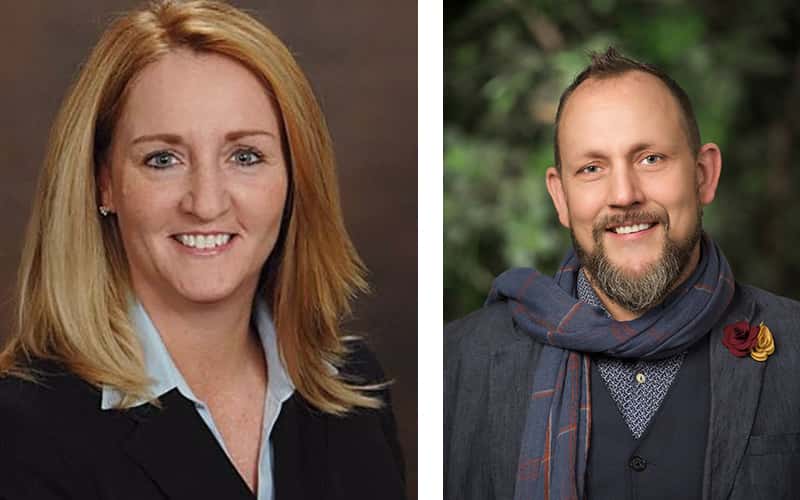Southern Connecticut State University’s Blue Economy project in Long Island Sound is gearing up to have a profound green impact.
The Project Blue Hub, created by a team of dedicated researchers and spearheaded by Colleen Bielitz, associate vice president for Strategic Initiatives & Outreach, and Patrick Heidkamp, professor in the Department of the Environment, Geography and Marine Sciences at SCSU, is the initial step towards creating a Blue Economy research, tech transfer and innovation hub in New Haven. By expanding the market for locally grown kelp and developing potential innovations aimed at the processing and marketing of kelp, the project will focus on the sustainable use of ocean resources for economic growth, improved lives, and ocean ecosystem health.
Rich in biodiversity, kelp can be grown and harvested year round. It doesn’t need chemicals, fertilizers or pesticides, so its production is low impact. Kelp forests are home to a wide array of species, from invertebrates and fish to marine mammals and birds. Perhaps most importantly, kelp helps improve water quality by ‘fixing’ the nitrogen content of the surrounding water, reducing ocean acidification.
The world’s oceans are big business: The Organization for Economic Co-operation and Development (OECD) reports the global ocean economy could double in size by 2030, reaching approximately $3 trillion. Based on information from a Southern Connecticut State University research team, the Long Island Sound Blue Economy is projected to grow by 67% during that same time frame to an estimated $13.3 billion.

“Project Blue is so important is because it will allow for continuous economic growth and the advancement of our local community,” Bielitz said. “Through our hub, we will resolve social problems in a sustainable and efficient way. We will develop new technologies, products and services to meet the needs of our community and beyond while continuously improving our capabilities through better use of our resources and assets, particularly the Long Island Sound.”
By using the emerging Long Island Sound kelp/seaweed industry as a catalyst for subsequent Blue Economy initiatives, Project Blue Hub aims to find alternative channels and develop niche markets for kelp through a concerted effort of research and development, innovation, and tech transfer to incubate local businesses.
These business will play a key role in the expansion of the kelp market, such as designing kelp-based cosmetic products; the creation of animal feed from seaweed; the development of bioplastics from Kelp/Seaweed; the utilization of kelp-based bioyarn and biotextiles; and assessing the potential for kelp use in the pharmaceutical industry. Rich in vitamins and minerals such as vitamin K, vitamin A, calcium, iron, and magnesium, expansion opportunities are ripe for kelp-based food products for consumers (for example, Fresh Kelp, Kelp Jerky, Kelp Beer, etc.). Kelp also is high in antioxidants, including carotenoids, flavonoids, and alkaloids, which help to fight against disease-causing free radicals.
Through partnerships with Gateway Community College and CT Next, Southern is prepared to provide up to 300 students with practical research and learning experiences in the burgeoning kelp industry in the next two years, creating an infrastructure for ocean farming innovation.
“Our students will form research innovation teams and create proof-of-concept products and innovations in the Blue Economy,” Bielitz said. “This will eliminate or shorten the learning curve to enter the blue innovation workforce. With our hub specifically designed for Blue Economy ideas to be hatched, we will provide students with the hard and soft skills needed to operate in this space.”
Southern’s Werth Center for Coastal and Marine Studies and the Department of the Environment, Geography and Marine Sciences have long served as advocates for and experts in Connecticut’s oceanic health; now, partnering with government agencies, relevant local NGOs and business partners, Southern’s Blue Economy Project is leading the charge to create an infrastructure for ocean farming innovation — the economy of which encompasses renewable off-shore energy development, tourism, fisheries, maritime transport, waste management, climate change, coastal resilience, and more.
“Our work will highlight the close linkages between ocean health, climate change, and the well-being of the state,” Bielitz said. “This goes beyond viewing the ocean economy solely as a mechanism for economic growth. We want to create sustainable models based on the circular economy. Similar to the Green Economy, our Blue Economy hub will focus on being inclusive while acting as good stewards of our earth with a focus on social equity, while also meaningfully reducing environmental threats and ecological scarcities.”


